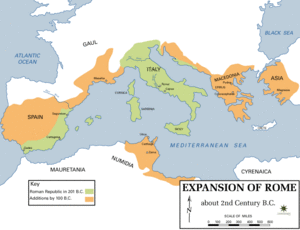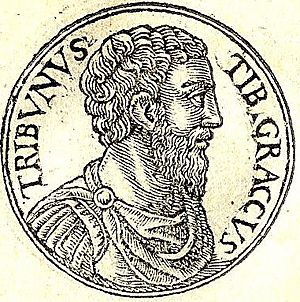Publius Mucius Scaevola (consul 133 BC) facts for kids
Publius Mucius Scaevola was an important Roman politician and lawyer who lived a long time ago, from about 176 BC to 115 BC. He held many important jobs in ancient Rome. He was a consul (a top leader) in 133 BC. Before that, he was a tribune of the plebs in 141 BC and a praetor (a judge) in 136 BC. After being consul, he became the pontifex maximus, which was the chief priest of Rome, for sixteen years. He passed away around 115 BC.
Scaevola was consul when Tiberius Gracchus was a tribune. Gracchus was a famous politician who was later killed. Scaevola helped the Senate (Rome's governing council) calm down after Gracchus's death. Some historians say Scaevola supported Gracchus's ideas for land reform, which aimed to give land to poorer citizens.
Contents
Scaevola's Family History
Publius Mucius Scaevola belonged to the Mucia family. This was a noble family in Rome. The Scaevolae were a main branch of this family. Many members of the Scaevola family held important positions in Rome even before Publius Mucius. This shows they were an important family in the Roman Republic for a long time.
The Legend of Scaevola
The family name "Scaevola" comes from a famous legend. It's about a man named Gaius Mucius Scaevola from 508 BC. The story says he tried to assassinate the Etruscan king, Lars Porsena. But he accidentally killed the king's secretary instead. To show his bravery, he put his own hand into a fire. He then declared that 300 young Romans like him would come for Porsena. This act supposedly scared the king so much that he left Rome. The name "Scaevola" means "left-handed," which might refer to this legend.
Publius's Relatives
Publius Mucius Scaevola's father also had the same name. His father was a consul in 175 BC. Publius became the chief priest (pontifex maximus) after his younger brother, Publius Licinius Crassus Dives Mucianus, died. His brother was also a consul in 131 BC.
Publius Scaevola was also the father of Quintus Mucius Scaevola. This son became a consul in 95 BC. He was known for a law called the Lex Licinia Mucia. This law sent Italian residents of Rome who falsely claimed Roman citizenship back to their hometowns.
Early Steps in Politics
Tribune of the Plebs (141 BC)
Publius Mucius Scaevola served as a tribune of the plebs in 141 BC. A tribune was a representative who protected the rights of common people. We don't know much about what Scaevola did during this year. One important thing he did was propose a law. This law put a man named Hostilius Tubulus on trial. Tubulus was accused of taking bribes when he was a judge (praetor) the year before.
Praetor (136 BC)
Scaevola was elected as a praetor (judge) in 136 BC. During his time as a judge, Scaevola strongly argued against the citizenship rights of Gaius Hostilius Mancinus. Mancinus had shown cowardice during a war campaign the previous year. He was handed over to the enemy as punishment, but they refused to keep him.
Consulship in 133 BC
Rome During Scaevola's Time
Publius Scaevola became a consul at a very important time for Rome. The Punic Wars had ended just 13 years earlier. Rome now controlled many new lands around the Mediterranean Sea. These lands came from military victories, like Scipio Aemilianus's conquest of Numantia in modern-day Spain. Also, the kingdom of Asia Minor was given to Rome in 133 BC. This happened when its king, Attalus III, died and left his land to Rome in his will.
However, a man named Eumenes III tried to claim these lands. In 130 BC, he defeated and killed Scaevola's brother, who was then a consul. Rome's fast growth during this time caused problems inside the country. For example, the First Servile War, a large slave revolt, started in Sicily two years earlier in 135 BC.
The Slave Revolt in Sicily
Scaevola's fellow consul, Lucius Calpernius Piso, led armies against the slave revolt in Sicily. This revolt was led by a man named Eunus. Eunus was a military leader who won some battles against larger Roman forces. Piso eventually stopped this long revolt. Scaevola was not very involved in this war. So, he didn't gain much popularity from it.
Tiberius Gracchus and Land Reform
Before Tiberius Gracchus created his important land law, the Lex Agraria, he talked to leading citizens. Publius Mucius Scaevola, who was consul at the time, was one of them. Historians say Scaevola was a very respected lawyer. After talking to Scaevola and others, Gracchus made a law that was fairer to people who were using public lands.
Scaevola's Role in a Conflict
When the conflict between Tiberius Gracchus and his opponents became very serious, Publius Mucius Scaevola refused to support those who wanted to remove Gracchus by force. However, after Gracchus was killed, Scaevola tried to bring stability back to the Senate. He approved the violent events that he had previously refused to support. Some historians believe he did this to keep Rome stable during a difficult time. Others think he simply changed his mind easily.
Later Life and Achievements
Chief Priest (130-115 BC)
Publius Mucius Scaevola became the pontifex maximus (chief priest) in 130 BC. This happened after his brother was killed in battle in the kingdom of Pergamum. His most famous contribution as chief priest was publishing the final Annales Maximi.
The Annales Maximi were historical records kept by the chief priest. They dated back to 400 BC. The pontifex maximus was responsible for writing down important events and the names of leaders each year. These records stopped being written in the 130s BC. Publius Mucius Scaevola officially published the complete collection of these historical records.
His Death
The exact year Publius Mucius Scaevola died is not known for sure. Writers from later times say he was still alive in 121 BC. However, he must have died before 114 BC. That's when a different chief priest led a trial of the Vestal Virgins.
See also
 In Spanish: Publio Mucio Escévola para niños
In Spanish: Publio Mucio Escévola para niños
 | Laphonza Butler |
 | Daisy Bates |
 | Elizabeth Piper Ensley |



